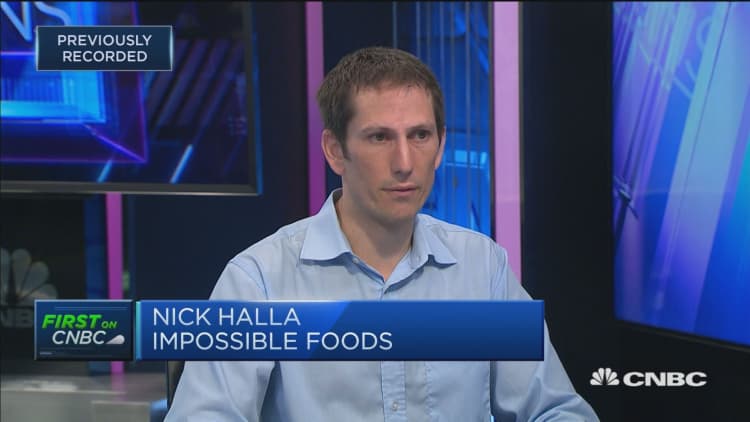The arms race for plant-based protein is heating up, and this time the oceans are under attack.
Impossible Foods, which is headed into grocery stores with its meat patty after getting FDA approval for the key ingredient heme earlier this week, recently announced it is working on a plant-based fish recipe as part of the company's mission to create replacements for all animal-based foods by 2035. The fish product will also use heme, the molecule responsible for making Impossible Burgers "bleed," to recreate the fish flavor without using an ounce of animal product.
With the average American consumer eating over 14 pounds of fish and shellfish every year, the fish and seafood market might become the next industry to be turned on its head by the alternative meat craze.
Start-ups across the country are racing to claim their bit of market share before Impossible Foods launches its fishless fish. However, developing the product is presenting companies with a challenge they didn't face when making plant-based hamburgers — the wide range of tastes across different species of fish.
"Fish come in such a variety of delicate flavors and textures, and to be able to mimic a variety of fish and then even cross into seafood ... that's really important to be able to kind of move across species and not be sort-of a one-trick pony in this space," said Lauren Jupiter, managing partner at AccelFoods, a food and beverage industry venture capital firm.
The palette for fish is not only wide ranging, but also very precise. Cole Orobetz, co-founder of plant-based meat company Alpha Foods, said when it comes to seafood, people can be hypersensitive to even the slightest off flavor. This makes it essential companies reach a high level of accuracy in their fish replications before going to market, a sentiment their investor AccelFoods also noted.
Sustainability benefits
This tedious product development is being propelled, and pressured, by the rapid depletion of the oceans.
Last year, the World Economic Forum reported almost 90% of the Earth's fish reserves were either fully exploited, overexploited, or depleted. Alyssa Plese, a member of UC Berkeley's Alternative Meats Lab, is confident plant-based fish could be the solution to the overfishing epidemic.
"They say that there's no such thing as sustainable seafood, so that's a really compelling reason why a lot of people are pursuing this," said Plese.
UC Berkeley's Alternative Meats Lab believes so strongly in this mission that it recently ran an experimental course challenging student teams to develop a good-tasting fish alternative. The winning team's product was a plant-based salmon burger based around fungi, algae, and seaweed. The group now operates as Prime Roots and recently secured over $4.5 million in seed funding.
The plant-based fish products are a better-for-you alternative that won't contain toxic metals like mercury, microplastics or other contaminants that could otherwise be in fish coming from oceans that are more and more compromised.Cole Orobetzco-founder of Alpha Foods
The sustainability incentive is one of the reasons Lauren Jupiter believes the primary market for fishless fish may not be die-hard vegans, but instead "flexitarians."
A flexitarian is, for lack of a better description, a vegetarian who occasionally cheats. Jupiter said flexitarians are often motivated by a desire to both eat healthy and have a positive world impact, making them the perfect customers for fishless fish.
"I think the No. 1 thing is going to be as people become more aware of sustainability and the current level of depletion of the ocean's resources, people are going to become more and more thoughtful around their fish consumption," Jupiter said.
While fish is already thought of as the gold standard for healthy proteins, experts are beginning to question the cleanliness of farm-raised fish. Orobetz made it clear these new alternative fish products will have a few distinct health benefits over their swimming competition.
"The plant-based fish products are a better-for-you alternative that won't contain toxic metals like mercury, microplastics or other contaminants that could otherwise be in fish coming from oceans that are more and more compromised," Orobetz said in an email.

The National Fisheries Institute, a seafood trade group, says the plant-based seafood companies are selling a "false narrative."
"Consumers don't need to be saved from what's arguably the healthiest animal protein on the planet," said NFI spokesman Gavin Gibbons.
He said the NFI does not think of these alternative companies as adversaries, or have a problem with their products, as long as they are labeled accurately. But some of them have chosen to market themselves by trying to "rhetorically inflate" seafood's challenges.
"Ninety percent of fisheries are not in peril. People aren't becoming toxic from fish. And consumers ingest more microplastics from breathing than from eating seafood," Gibbons said, referencing recent research on microplastics consumption by humans outside the seafood context.
Other recent studies have investigated increasing concerns about microplastics in the oceans and that can be consumed by fish.
The FDA and EPA do provide guidance on mercury levels in fish as part of overall guidance related to foods that they deem to be healthy eating choices, which includes fish and seafood.
International markets
Jupiter sees strong opportunities for fishless fish across the globe.
China's processed fish and seafood market is over three times as large as that of the U.S., and Impossible Foods is already beginning to incorporate Asia into its expansion plans.
All eyes will be on Impossible Foods and its competitors to see who will strike first in this space. Impossible Foods declined to comment.
Beyond Meat has not discussed seafood and played its cards close to the vest in its earnings call last Monday. It is reportedly interested in additional protein replacements, such as meatless bacon, but did not provide any specifics on Monday's call beyond saying pork is a "core" product area.
Some ambitious start-ups plan to beat the new food giants to the punch.
Orobetz said Alpha Foods has developed a product similar to McDonald's Filet-O-Fish and a fish chips white cod cutlet, both entirely plant-based. Orobetz is predicting the company will bring its first Alpha Fish products to market in 2020. Other startups are developing plant-based seafood products ranging anywhere from shrimp-less shrimp to eel-less eel.
Advancements like these have made Jupiter incredibly optimistic about the future growth potential in this space.
"I think it's exciting that people are starting to pay attention to it, especially from the environmental and sustainability perspective," Jupiter said. "We're excited to see who comes to the forefront with a solution that we think will be scalable and ... accomplish what is a pretty big goal ahead."
This story has been updated to include comments from the National Fisheries Institute, and to reference recent studies on microplastics and government guidance about mercury in food.






